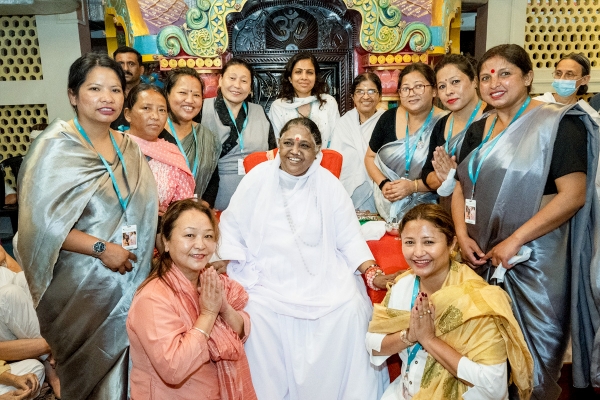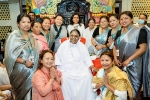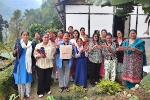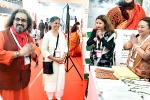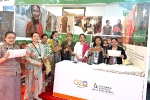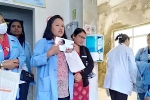ASHAs (Accredited Social Health Activists) representing all districts of Sikkim made the long journey from their villages in the Eastern Himalayas to Amma’s ashram in Kerala for training on how to conduct awareness workshops on reusable pads.
ASHAs are community health workers employed by the Ministry of Health and Family Welfare (MoHFW) as a part of India's National Rural Health Mission (NRHM). They help connect marginalised communities to their local health care facilities. Last year the World Health Organization (WHO) recognised the over one million ASHA workers in the country as “Global Health Leaders”.
The team from Sikkim that visited Amritapuri included Hom Kumari Pradhan from Singtam East Sikkim, Asha Lepcha from North District Labi Bakcha, Sangita Sherpa from Soreng District Phe, Puspha Sharma from South District, Renuka Gurung from Geyzing West District and Meenu Gurung from Pakyong District Phe. They learned more about menstrual hygiene and ETW’s Saukhyam Reusable Pads project.
Now they are conducting awareness workshops in their respective districts to make subsidised reusable pads available to rural women there. Social workers Junnu Chettri, Sunita Tamang, and Sara Lama accompanied the ASHA workers and are similarly working in their regions to help make reusable pads more mainstream.
The project is supported by a Corporate Social Responsibility (CSR) grant from Sikkim Urja Ltd. The company is a Govt of Sikkim enterprise and the Saukhyam collaboration is being done with the support of the state’s Chief Minister.
“Just like Sikkim is the first state in the country to become completely organic, we hope that it will be the first state to completely replace disposable sanitary napkins with reusables that are much better for us and our planet,” said Ms Pallavi Mittal, CSR Head, Sikkim Urja Ltd.
The ASHA team from Sikkim had the opportunity to attend the Civil 20 Conclave by the working group for Sustainable & Resilient Communities that was recently held in Gangtok. Members interacted with various delegates, confidently explaining why reusable is better for our seas, trees, bodies and wallets.
“We have sold all the pad sets that we were provided. Those who are using them are sharing very good feedback. The pads are easy to wash and dry, they are saying,” said Ms Meenu Gurung, ASHA, Pakyong District Phe.
“In fact, just now, one of them called me on the phone to say that this pad you shared is excellent. She told me she usually gets itching during her period. With this pad, absolutely no itching. She also said she gets really bad back pain. None of that either. Getting this feedback has had a very positive impact on us, too. As health workers, we are definitely going to continue this project.”
Amma started the Saukhyam project in 2017 so that women and girls in remote, rural communities have access to a high-quality product for menstrual hygiene at an affordable cost. Team Saukhyam makes subsidised pads available not only in India but also Nepal, Malaysia, South Africa and Mexico.
“Amma saw that a lot of the health and education related problems of women and girls in remote, rural areas is due to the fact that there is not much attention paid to menstrual hygiene matters,” said Ms Anju Bist, Managing Director of Saukhyam Reusable Pads.
“Girls drop out of school or miss school due to periods, women have greater risk of reproductive health issues and even cervical cancer when there is poor menstrual hygiene. Amma started the Saukhyam project for these reasons.”
Also known as ‘Padwoman of India’, Ms Bist was awarded the Women Transforming India award from NITI Aayog of the Government of India in 2022 and Saukhyam was recognized as a “strong root for tomorrow’s India.” Saukhyam also won the best social initiative on menstrual hygiene award earlier this year during the annual menstrual hygiene conference in New Delhi, India.
PHOTO 1: ASHAs representing all districts of Sikkim made the long journey from their respective villages in the North to Amma’s Ashram in Kerala.
PHOTO 2: The ASHA team at home in Sikkim. The state is in the Eastern Himalayas and known for its biodiversity, including alpine and subtropical climates.
PHOTO 3: The stall for Saukhyam at the C20 Conclave for Sustainable & Resilient Communities. Swami Amritaswarupananda Puri is to the left and Ms Anju Bist, Managing Director of Saukhyam, is centre.
PHOTO 4: ASHAs made connections with many delegates at the SRC Conclave and later received positive feedback from women who bought pad sets.
PHOTO 5: An ASHA at work in a village in Sikkim during a menstrual hygiene awareness workshop.



